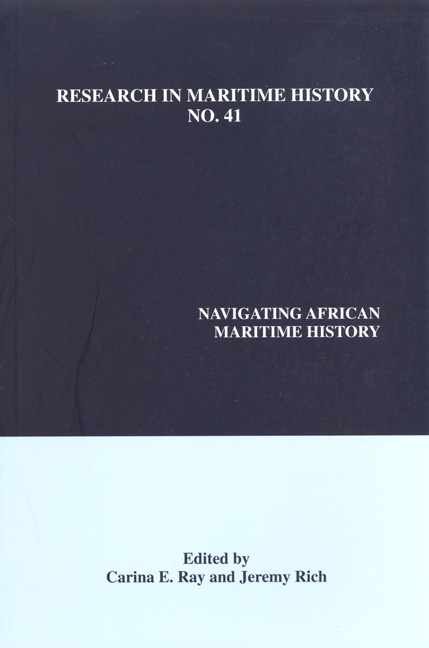Book contents
- Frontmatter
- Table of Contents
- About the Editors
- Contributors' Notes
- “Introduction: Charted Routes and New Directions in the Study of Africa's Maritime History”
- “Austronesian Mariners and Early Trans-Indian Ocean Crossings”
- “Eight Hens per Man per Day: Shipwreck Survivors and Pastoral Abundance in Southern Africa”
- “State Control and Regulation of Commerce on the Waterways and Coast of Senegambia, ca. 1500-1800”
- “Swimming, Surfing and Underwater Diving in Early Modern Atlantic Africa and the African Diaspora”
- “Rough Sailing: Risks and Opportunities for Immigrant African Maritime Workers in Gabon, ca. 1860-1914”
- “Desertion, Dereliction and Destitution: The Travails of Stranded West African Seamen in the United Kingdom, ca. 1921-1934”
- “‘The White Wife Problem:’ Sex, Race and the Contested Politics of Repatriation to Interwar British West Africa”
- “Sailing Beyond Apartheid: The Social and Political Impact of Seafaring on Coloured South African Sailors”
“State Control and Regulation of Commerce on the Waterways and Coast of Senegambia, ca. 1500-1800”
- Frontmatter
- Table of Contents
- About the Editors
- Contributors' Notes
- “Introduction: Charted Routes and New Directions in the Study of Africa's Maritime History”
- “Austronesian Mariners and Early Trans-Indian Ocean Crossings”
- “Eight Hens per Man per Day: Shipwreck Survivors and Pastoral Abundance in Southern Africa”
- “State Control and Regulation of Commerce on the Waterways and Coast of Senegambia, ca. 1500-1800”
- “Swimming, Surfing and Underwater Diving in Early Modern Atlantic Africa and the African Diaspora”
- “Rough Sailing: Risks and Opportunities for Immigrant African Maritime Workers in Gabon, ca. 1860-1914”
- “Desertion, Dereliction and Destitution: The Travails of Stranded West African Seamen in the United Kingdom, ca. 1921-1934”
- “‘The White Wife Problem:’ Sex, Race and the Contested Politics of Repatriation to Interwar British West Africa”
- “Sailing Beyond Apartheid: The Social and Political Impact of Seafaring on Coloured South African Sailors”
Summary
Introduction
The economic dynamics of the Atlantic world linked Europe to Senegambia in ways that produced significant commercial activity from the fifteenth through the eighteenth centuries. The success of these activities was based largely on the visits and permanent placement of representatives whose presence facilitated international commercial relations. Commercial and diplomatic ties had existed between African and European states in Senegambia since the fifteenth century, but these expanded in the seventeenth and eighteenth centuries. In this later period, permanent representatives of European companies stayed for lengthier periods in Senegambian states.
In this system of exchange and diplomatic relations, the decisionmaking powers of host African states were quite real. European traders, who acted as agents of emerging modern capitalism, had to take into account African states’ absolute sovereignty over geographic space. This was particularly true with regard to the ways that Senegambian rulers controlled maritime and inland waterways, which were crucial places of international contact. My approach to analyzing diplomatic negotiations between Europeans and Africans from the fifteenth to the eighteenth century compares documents from European archives with African narratives of oral tradition. This study critiques the notion of “Africa's discovery,” and other allied terms (e.g., “possession,“ “concession” and “trading post“) that were later conventionalized in European historiography. For Senegambian and other African sovereigns, such notions remained alien to their relations with Europe, as they viewed agreements be tween European states and their own governments only as commercial matters rather than a surrender of territorial sovereignty.
Trade and diplomacy in Senegambia were shaped by two opposing economic logics. First, there was the European maritime powers’ logic of “monopoly and exclusive rights” as defined in company charters and papal bulls. Second, there was the Senegambian states’ opposing logic of commercial liberalism and free markets. Lat-Sukaabe Faal, king of the Kajoor-Bawol kingdom between 1696 and 1720, most notably expressed this conception of trade and space, but it had existed since the fourteenth century. Senegambian conceptions of royal power had social, political and economic aspects that concentrated on the regulation of trade as well as maritime and inland waterways. It suggests equally the reconstruction of a great pan-Wolof state that was able to impose its hegemony on the terms of the slave trade because of its internal political and social authority and strong and active diplomacy.
- Type
- Chapter
- Information
- Navigating African Maritime History , pp. 57 - 80Publisher: Liverpool University PressPrint publication year: 2009



